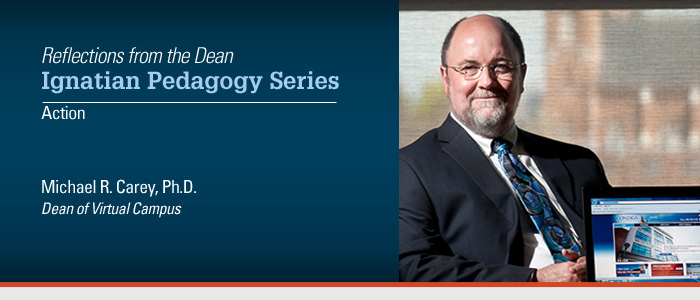Our exploration of Ignatian Pedagogy continues with a focus on the dynamic of Action. My presentation is based on a document entitled “Ignatian Pedagogy: A Practical Approach,” which was written by the International Commission on the Apostolate of Jesuit Education in 1993.
As I mentioned previously, the Ignatian pedagogical process begins with Context, so that we know as much as we can about the reality within which learning takes place. From there learning itself always proceeds with Experience, whether that happens directly or vicariously, in real-time or through memory. Next comes Reflection, in which the learner takes the perceived data and affective responses and organizes them to capture the meaning and essential value of the subject.
Reflection would wither on the vine, however, if it ended with understanding and affective reactions. The Ignatian dynamic of Reflection began in reality through the dynamic of Experience, and it must lead back to reality through the dynamic of Action.
Action means that opportunities are provided that will challenge the imagination and exercise the will of learners to choose the best possible course of action to flow from and follow up on what they have learned.
Internal human growth is based upon experience that has been reflected upon and manifested externally. It involves two steps:
- Interiorized Choices: the learner chooses to make the truth his or her own while remaining open to where the truth might lead.
- Choices Externally Manifested: the meanings, attitudes, values which have been interiorized, or made part of the person impel the learner to act in a manner consistent consistent with this new conviction.
Although there is freedom in the choices the learner makes, there is also a drive in Ignatian Pedagogy toward what is called the magis—the “more”—which means those actions that are in better service of God and people.
Action makes the transformation real, but that is still not the end of the story, because the story around the learner is still developing and changing. Evaluation is the final dynamic stage of Ignatian Pedagogy, not only to access outcome achievements, but to encourage the learner and to stimulate further reflection. In the final presentation I will share some background on this particular dynamic of Ignatian Pedagogy.
Dr. Michael Carey
